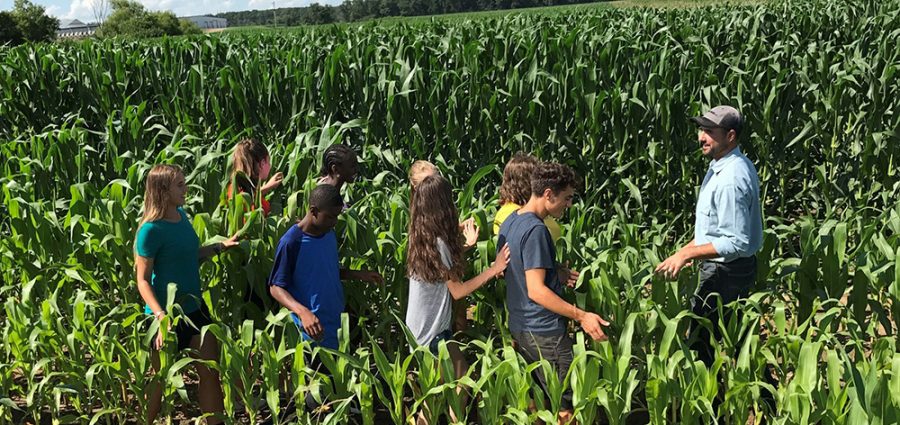GENYOUth, a national nonprofit organization dedicated to creating healthier school communities, released today the results of Youth & the Future of Food, a nationally representative survey of American teens’ views on food and its relationship with the planet.
The GENYOUth Insights survey revealed that while today’s youth care strongly about both food and the environment, they don’t understand how these two global issues are connected, where their food comes from, or even why it matters. At the same time, the study suggests that the future of food systems and sustainability may be strengthened by increased leadership and engagement from America’s teens.
A recently released World Health Organization/UNICEF/Lancet report noted that “sustainability is for and about the next generation – we must find better ways to amplify children’s voices and skills for the planet’s healthy future.”
“Our GENYOUth Insights Survey reveals America’s teens don’t yet think about or understand the relationship between food and the health of our planet. Yet the good news is that they have a strong desire to connect the food they eat with the world they live in,” said Alexis Glick, CEO of GENYOUth. “It’s crucial that they have the knowledge to serve as smart stewards in support of a healthy planet and people. GENYOUth is committed to partnering with America’s farmers and food manufacturers to help youth understand and appreciate the vital connection between farming, food production and a sustainable and healthy planet.”
GENYOUth surveyed over 1,700 teens ages 13 to 18 on a wide range of sustainable-related topics, including the role food plays in their lives, where the food they eat comes from, if and how they connect food to the planet, and who they depend on for clear and trusted information. The results provide an interesting snapshot of the food priorities and paradoxes of this generation, as well as opportunities to help ensure youth can lead, act and choose wisely in today’s food environment.
For Teens, Food Sustainability Is Not an Important Everyday Issue
In young peoples’ daily lives, sustainability is not nearly as important as more immediate and tangible priorities.
- They are twice as likely (65 percent to 33 percent) to think about food’s healthfulness versus its environmental impact.
- When deciding what to eat or drink, taste dominates, with 91 percent citing it as a key factor, followed by cost and health (both 76 percent), and then whether food is produced in an environmentally friendly manner (60 percent).
- The fact that sustainability in the context of food production is not top-of-mind for teens is further illustrated by the proportion of teens who say they think about where food comes from (40 percent), whether the food they eat impacts the environment negatively (33 percent), and the small number who read or talk with others about how food is grown, raised or produced (25 percent).
Youth Don’t Understand Sustainable Food but Are Hungry for Information
American teens’ don’t understand the connection between food, nutrition, and the environment.
- Just 21 percent say they are very knowledgeable about where food comes from while 40 percent say they know little to nothing about the topic.
- But they want to know more, with clear majorities interested in learning more about producing food in earth-friendly ways (66 percent), feeding the world’s growing populations (62 percent), knowing where their food comes from (60 percent), and “food that’s good for me and good for the planet” (56%).
Allies in Education: Who Teens Want to Hear From
To help them understand where their food comes from and the importance of making sustainable food choices, teens are craving guidance from trusted sources.
- It is those closest to the land — farmers – who are really seen as trusted allies, with 64 percent of young people saying they would like to visit a farm and talk with a farmer and 83 percent interested in hearing even more from those who work directly in agriculture.
- Conversely, while a clear majority (84 percent) want to hear about sustainable food issues from food companies and brands, restaurants, and grocery stores, they don’t rise up as go-to resources for teens. In fact, youth feel that companies that produce and package food actually make it more difficult for them to make sustainable and healthy eating choices.
Hunger is Closely Linked with Sustainable Food
Among sustainable nutrition issues of significance, hunger stands out, both as a condition facing too many teens and as a big concern for most. One in five (21 percent) worry about whether they will have enough to eat on a daily or weekly basis, while four out of five (80 percent) are very concerned about helping feed people who don’t have enough to eat. In the COVID-19 era, with tens of millions of food-insecure kids at risk due to school disruptions and climbing unemployment figures, hunger will inevitably become an even bigger source of concern.
For today’s teens, knowledge is the clearest path to engagement and leadership. As Jimena T., an 11th grader from Texas said: “If youth have access to information about where their food comes from, they can make educated decisions about the food they eat. One of the most worthwhile things I’ve done recently was to visit and see how a dairy farm operates. It allowed me to start connecting the dots between what’s grown on the land and what’s sold in the store. And that’s given me a new-found appreciation for food and our planet.”
To review “Youth & the Future of Food,” including opportunities for taking action, visit genyouthnow.org/reports.






